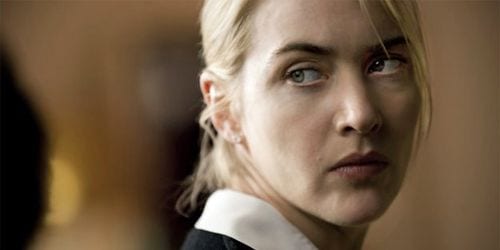
“They want to give the tooth a chance.” Michael (John C. Reilly) means his 11-year-old son’s tooth, recently broken with a stick wielded by another boy. Michael and his wife Penelope (Jodie Foster) stand near the door of their apartment, about to see off the parents of the stick wielder, Alan (Christoph Waltz) and Nancy (Kate Winslet). They’ve come to meet and lament the interaction, to write statements describing what little they know of what happened, and also, it turns out, to arrange a time for the boys to meet and reconcile. As the couples stand uneasily, not ready to go or stay, admit or forgive, they consider the tooth in the abstract, the possibility that its damaged nerve might heal. The victim is too young for an implant. So they’ll be waiting to see what happens.
They don’t wait long at all, however, to reveal themselves to be fractious individuals, and resentful parents and unhappy spouses to boot. A brisk sort of chamber piece, Carnage — based on Yasmina Reza’s award-winning play, God of Carnage — exposes all kinds of raw and damaged nerves, the couples aligning and re-aligning, aggrieved and mournful, utterly blind and briefly, sometimes painfully, self-aware. Directed by Roman Polanski, the film reaffirms that people in close quarters in the movies — especially once they start drinking — can be very, very mean to one another.
The most obvious point is that the children’s interaction — acted out very briefly and at a long distance as the film opens, the figures so tiny, with the East River wide behind them, it’s hard to make out exactly what they’re doing. Framed by dark tree branches and attended by a perky piano soundtrack, the boys’ bad behavior gives way to a shot of the parents’ backs, much closer to the camera but equally remote: Penelope taps out the final letters in her statement, the camera dollies out to emphasize the tension. As the couples head into the living room, they debate language — was the aggressor “armed” with the stick or just “carrying” it? — revealing their investments in appearances, if not meaning, precsely. By the time they reassemble by the door and start talking about teeth, it’s clear they’re not going to be parting ways soon, as much as any of them might wish it.
As it tracks the unraveling of the adults’ civility, Carnage draws attention again and again to its arbitrariness, and especially, how it’s a function of power. The couples take sides against each other, the men take sides against the women, the would-be caring parents against the self-admitted kid-haters. At first, they’re defined by jobs: Nancy’s an investment banker, Alan a corporate lawyer. He establishes his complete disinterest in the negotiations over his son’s apology and by taking a series of incoming calls about a current case in which he’s defending a pharmaceuticals company. Listening to his side of these conversations, his wife and hosts look at first uncomfortable and then try their best to talk over him, as if he’s not in the room, complaining and instructing and making quite clear that his tactics are reprehensible and ruthless.
Describing his own line of work, selling housewares (doorknobs and bathroom fixtures), Michael sounds at first apologetic and then defensive, revealing right away that he’s capable of his own kind of ruthlessness, namely, putting his young daughter’s hamster out into the street at night, when it has squeaked its wheel one too many times.
As soon as Michael tells this story, Nancy is visibly horrified. Still, it’s only later in the afternoon, as the couples continue to trade queries and insults, that she reveals just how horrified: “You killed that hamster, you yourself are a murderer,” she announces, “You left it out there trembling with fear in a hostile environment.” Her word picture effectively paints the hamster’s perspective at the same time that it helps make the sons’ disagreement seem a logical product of their fathers’ hardly submerged aggressions. Michael’s emerge in increasingly ugly forms: his stories and then his invectives (mostly against his wife) indicate that he’s a stereotypically angry American working guy after all, racist, misogynist, and wholly exasperated by Penelope’s controlling nature and hyper-educated affect (what he calls her “high falutin’ claptrap”).
Early on, Penelope reveals the extent of her efforts: not only does she bake pear-apple cobblers (and then kvetch that the housekeeper puts it in the refrigerator despite instructions not to: “I don’t know what language I’m supposed to speak to that woman in!”), but she’s also “working on a book about the Darfur tragedy.” This makes her compassionate, she believes, at least more aggressively than her company and her husband (whom she’s had to “dress up like a liberal” for the sake of the visitors). At the same time, Nancy fumes at Alan’s discourtesy while also clinging to her identity as a wife with, she thinks, some independent identity.
That the parents can’t find ways to make peace is both the film’s starting point and endpoint. Their class tensions and gendered resentments are familiar, as is the film’s submission that they have been visited on the children, that the boys’ recent violence — one’s bullying and the other’s response — is a function of the parents’ not-so-repressed hostilities. It’s not a little amusing when one parent’s frustration erupts literally, in projectile vomit all over the art books on the coffee table. Neither is it subtle.

![Call for Papers: All Things Reconsidered [MUSIC] May-August 2024](https://www.popmatters.com/wp-content/uploads/2024/04/all-things-reconsidered-call-music-may-2024-720x380.jpg)



